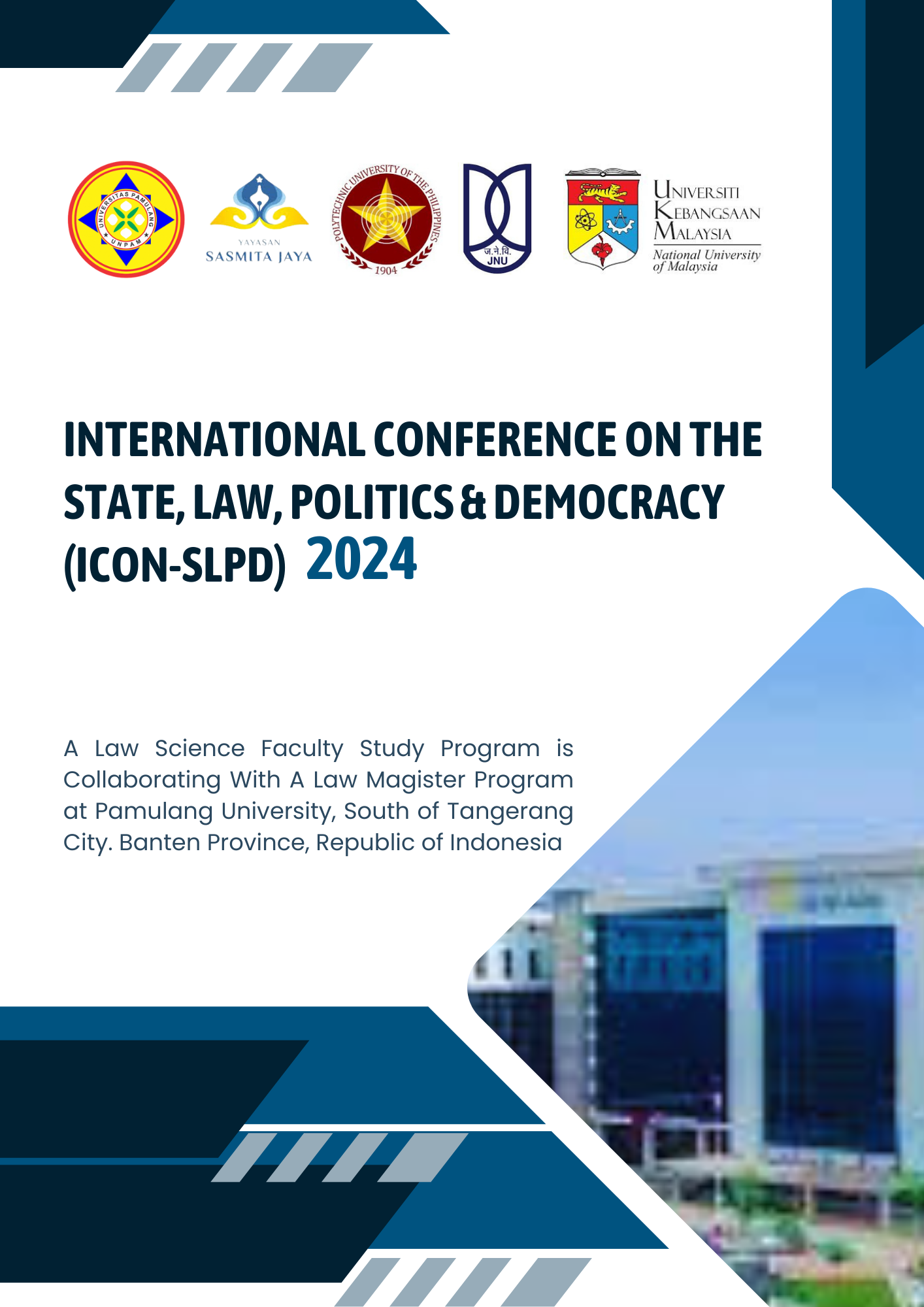The Principle of Termination in Employment Contract: A Comprehensive Analysis of Indonesia Labour Law
Keywords:
Principles, Termination, Labour LawAbstract
This research aims to analyze the development of principles in the termination of employment relations that exist in the legislation regarding employment in Indonesia, and its impact on the legal protection of the right to job security for workers. The legal research method in this research is normative research using a historical approach to analyze the development of the principles of employment termination in the history of the existence of labor law in Indonesia starting from post-independence Indonesia, and explain how these developments affect legal protection for workers. The results of this study show that during the period of the enactment of the Civil Code at the beginning of Indonesian independence, there was no role of the state in regulating the principles of employment relations as a form of legal protection for workers. The development of the principles of employment termination guaranteed by the state began during the socialization process of labor law and is seen in the enactment of the Labor Law, the Labor Dispute Resolution Law, the Law on Termination of Employment in Private Companies, up to the Employment Law. The latest development seen in the enactment of the Job Creation Law has significantly degraded the application of the principles of employment termination and resulted in reduced legal protection for workers
References
Adhistianto, Mohamad Fandrian.. “The Unconstitutionality of Termination of Employment on The Grounds of An Urgent Offence.” Pandecta Research Law Journal 18, no. 1 (June 23, 2023): 88–99. https://doi.org/10.15294/pandecta.v18i1.41830.
Adhistianto, Mohammad Fandrian. “Politik Hukum Pembentukan Rancangan Undang-Undang Cipta Kerja (Studi Klaster Ketenagakerjaan).” Pamulang Law Review 3, no. 1 (August 15, 2020): 1. https://doi.org/10.32493/palrev.v3i1.6530.
Aryani, Nyoman Mas, Ayu Putu Laksmi Danyathi, and Bagus Hermanto. “Quo Vadis Protection of The Basic Rights of Indonesian Workers: Highlighting The Omnibus Legislation and Job Creation Law.” Pandecta Research Law Journal 17, no. 1 (July 4, 2022): 104–20. https://doi.org/10.15294/pandecta.v17i1.34948.
Azed, Abdul Bari. “Aspek Yuridis Pemutusan Hubungan Kerja di Perusahaan Swasta.” Jurnal Hukum dan Pembangunan, n.d., 434–48.
Buana, Mirza Satria, and Rahmat Budiman. “Indonesia’s Minimum Wage Policy After The Omnibus Law.” UUM Journal of Legal Studies 13 (2022). https://doi.org/10.32890/uumjls2022.13.2.8.
Djakaria, Mulyani. “Perlindungan Hukum Bagi Pekerja Wanita Untuk Memperoleh Hak-Hak Pekerja Dikaitkan Dengan Kesehatan Reproduksi.” Jurnal Bina Mulia Hukum 3, no. 1 (2018). https://doi.org/10.23920/jbmh.v3n1.2.
Hadistianto, Mohammad Fandrian. “Problematika Regulasi Mengenai Daluwarsa Gugatan Perselisihan Hubungan Industrial Di Indonesia.” Refleksi Hukum: Jurnal Ilmu Hukum 7, no. 1 (October 31, 2022): 1–18. https://doi.org/10.24246/jrh.2022.v7.i1.p1-18.
Hoesin, Siti Hajati, and Fitriana. Memahami Hubungan Kerja dan Hubungan Industrial di Indonesia. Jakarta: Damera Press, 2023.
Izzati, Nabiyla Risfa. “Deregulation in Job Creation Law: The Future of Indonesian Labor Law.” PADJADJARAN Jurnal Ilmu Hukum (Journal of Law) 9, no. 2 (2022): 191–209. https://doi.org/10.22304/pjih.v9n2.a3.
Kome Akpulat, Ayse. “The Principle of ‘Ultima Ratio’ in Termination of Employment Contract in Turkish Labour Law.” Annales de La Faculté de Droit d’Istanbul, November 26, 2019, 43–57. https://doi.org/10.26650/annales.2018.67.0004.
Santoso, Budi. “Prinsip - Prinsip Pemutusan Hubungan Kerja oleh Pengusaha,” 129–45. Depok: Badan Penerbit Fakultas Hukum Universitas Indonesia, 2018.
Saprudin, Mr. “Socialisering Process Hukum Perburuhan Dalam Aspek Kebijakan Pengupahan.” Mimbar Hukum - Fakultas Hukum Universitas Gadjah Mada 24, no. 3 (February 1, 2013): 542. https://doi.org/10.22146/jmh.16124.
Sarjana, I Made, Kadek Agus Sudiarawan, Laura Antoinette Medd, I Putu Bimbisara Wimuna Raksita, and Bagus Hermanto. “Omnibuslaw Employment Cluster: Is It a Form Of Labor Exploitation In The Indonesian Context?” UUM Journal of Legal Studies 14 (2023). https://doi.org/10.32890/uumjls2023.14.1.3.
Shubhan, M. Hadi. “Penggunaan Instrumen Sanksi Pidana Dalam Penegakan Hak Normatif Pekerja/Buruh.” Arena Hukum 13, no. 01 (April 30, 2020): 1–23. https://doi.org/10.21776/ub.arenahukum.2020.01301.1.
Simanjuntak, Payaman. Undang-undang yang baru tentang Ketenagakerjaan. Jakarta: Elsam Lembaga Studi Dan Advokasi Masyarakat, 2003.
Singadimedja, Holyness. “Resensi Buku: Hukum Ketenagakerjaan: Hakikat Cita Keadilan Dalam Sistem Ketenagakerjaan.” Jurnal Bina Mulia Hukum 4, no. 2 (March 15, 2020): 369. https://doi.org/10.23920/jbmh.v4i2.419.
Sitompul, Manahan M. P. Perkembangan Hukum Ketenagakerjaan Dan Perlindungan Hak-Hak Konstitutional Pekerja/Buruh Indonesia. Cetakan ke-1. Tapos, Depok: RajaGrafindo Persada, 2021.
Suhaimi. “Problem Hukum Dan Pendekatan Dalam Penelitian Hukum Normatif.” Jurnal Yustisia 19, no. 2 (2018). https://doi.org/10.53712/yustitia.v19i2.477.
Tampubolon, Manotar, Gindo L. Tobing, and Wahyuningtyas. “Human Enslavement: Indonesians’ Encounter During Dutch Colonization.” Asian Journal of Research in Education and Social Sciences, March 1, 2022. https://doi.org/10.55057/ajress.2022.4.1.6.
Tan, David. “Metode Penelitian Hukum: Mengupas Dan Mengulas Metodologi Dalam Menyelenggarakan Penelitian Hukum.” Nusatara: Jurnal Ilmu Pengetahuan Sosial 8, no. 8 (2021). http://dx.doi.org/10.31604/jips.v8i8.2021.2463-2478.
Uwiyono, Aloysius. “The Role Of Law In Labor Field In The Globalization Era.” Indonesian Journal of International Law 1, no. 1 (August 12, 2021). https://doi.org/10.17304/ijil.vol1.1.199.





